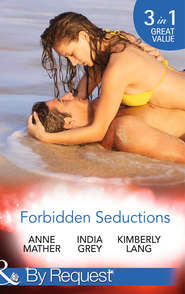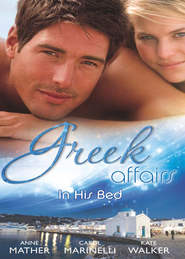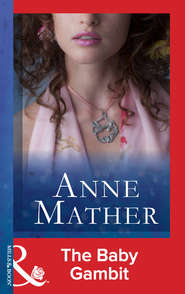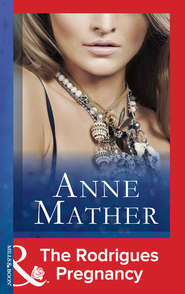По всем вопросам обращайтесь на: info@litportal.ru
(©) 2003-2024.
✖
The Medici Lover
Автор
Год написания книги
2018
Настройки чтения
Размер шрифта
Высота строк
Поля
But again fate had taken a hand in the person of Abdul Fezik. Three days after Pietro’s invitation, the hotel manager sent for Suzanne. He had a request to make of her, he had said, half reluctantly she had felt, immediately apprehensive. He had been approached, he went on, by one of their guests, Mr Fezik, who intended holding a reception in the hotel during the Bank Holiday weekend. Mr Fezik needed someone to act as his hostess at the reception, and had suggested that perhaps Suzanne might be persuaded to accept.
Once again, Suzanne had been staggered by the man’s audacity. After everything that had gone before he still would not believe that sooner or later she would not succumb to his personality. Before she knew what she was saying, she had informed the manager that regretfully she could not accept Mr Fezik’s invitation, that she had already made arrangements for the weekend, that she was spending Easter in Italy with her boy-friend’s family.
Surprisingly, the manager had seemed slightly relieved. Perhaps, contrary to Suzanne’s beliefs, he had been aware of what was going on. In any event, he accepted her apologies with a smile, and assured her that she had no need to consider altering her arrangements.
Pietro had naturally been delighted when she had told him she had changed her mind about coming to Italy, but affronted when she suggested it might be better if she stayed at an hotel.
‘Castelfalcone is just a village,’ he had protested, in his heavily accented English. ‘There is no hotel—just the pensione. It would not be right for a guest of my family to stay at the pensione.’
And so Suzanne had acquiesced. It was only a few days, after all. She had to return to London the following Tuesday. As they were flying out on Thursday, it was only a matter of four days.
Nevertheless, as the aircraft carrying them to Venice took off from London’s Heathrow Airport, the ambiguity of her position began to make Suzanne uneasy. Pietro had told her that he had written to his mother, but not what he had said, and she couldn’t help wondering whether he had implied a relationship between them that stemmed more from his imagination than reality. What if his mother questioned their association, what could she say? What would Pietro say?
Pietro’s small sports car had been waiting for him at the airport. They had cleared passport control and Customs with the minimum amount of fuss, and emerged into the mild afternoon air, feeling the weight of their heavy clothes. The sky was vaguely overcast, but the light was brilliant, making Suzanne grope for her dark glasses in her bulky handbag.
Watching the other passengers making for the motorboats and buses made Suzanne wish they were staying in Venice. How much simpler it would have been to book in anonymously at some hotel, without the daunting prospect of facing Pietro’s unknown relatives.
They drove north, leaving the canals and campaniles of the city behind. The autostrada was busy with holiday traffic, and Suzanne, who had never driven with Pietro before, was alarmed by his reckless disregard for other motorists. He was obviously one of those men who assumed a different character behind the wheel, and her palms were moist and she was reassessing her opinion of him when they turned off the autostrada on to a narrower, rougher road.
In an effort to divert him and herself, Suzanne allowed herself the privilege of asking questions she had hitherto avoided. ‘Do you and your mother live alone?’ she queried tentatively, speaking in Italian to make it easier for him.
Pietro took a few moments before replying, pretending to concentrate on passing a farm cart drawn by a pair of rather tired-looking oxen, but eventually he said: ‘No. We live in the house of my cousin.’
‘Your cousin?’ Suzanne’s dark eyebrows arched.
Pietro nodded, his hands tightening on the steering wheel. ‘I told you, Suzanne—my father died some years ago.’
‘Well, yes …’ Suzanne considered the situation. ‘And your cousin lives at Castelfalcone.’
‘That is correct.’
Suzanne drew her lower lip between her teeth, wishing he would be a little more forthcoming. ‘Your—er—cousin is married?’ she probed, and Pietro nodded once more.
Suzanne tried to picture the household. She knew Italians held very strongly to the family ideal, but two women running a home was seldom successful. What was Pietro’s mother’s position in the household? Were there children? Was she her nephew’s housekeeper, or nursemaid to his children? Did other members of the Vitale family live in the house? Suzanne wished she had asked some of these questions before leaving London.
‘What—what does your cousin do?’ she queried unwillingly, and was surprised at the look of bitterness which crossed Pietro’s face.
‘Do?’ he echoed. ‘What do you mean—what does he do?’
Suzanne, who had thought the question quite a simple one, shook her head. ‘I meant—what is his occupation?’ she explained swiftly. ‘I presume he does have one, doesn’t he?’
Pietro glanced sideways at her. ‘My cousin is disabled,’ he stated harshly. ‘He had an accident three years ago.’
‘Oh!’ Suzanne wished she had never asked the question. She felt as if she had intruded into some personal tragedy, although there was curiously little sympathy in Pietro’s voice. ‘I’m sorry.’
Pietro shrugged. ‘These things happen. Mazzaro is lucky to be alive.’
‘Mazzaro? That’s your cousin’s name?’
‘Mazzaro di Falcone, yes.’
‘Falcone?’ Suzanne couldn’t prevent the ejaculation. ‘But …’ She paused. ‘I assumed his name would be the same as yours.’
‘No.’ Pietro shook his head. ‘Mazzaro’s father was my mother’s brother.’
‘I see.’
Suzanne stared out at the countryside through which they were passing. A fugitive gleam of sunlight was gilding the spire of a church she could see high up on the hillside. They were in rugged country, presently following a route that traced the winding course of a stream before rising to overlook the valley, rich with fields of ripening grain. They had passed through several villages, hamlets mostly, and ahead of them were rising the ascending plateaux of the Alps, snow-capped and magnificent, their pine-clad slopes the home of marmot and wild deer.
It was beautiful country, but Suzanne was paying little attention to the scenery. Something about Pietro’s cousin’s name was familiar, and it took her several minutes to realise it was the same as the village. Or almost. Castelfalcone … Falcone.
‘Pietro—’ she began, only to have him interrupt her by asking whether she was hungry or tired, explaining that it was not much further now. His smile attempted to reassure her, and Suzanne shrugged, defeated. She would, without doubt, learn soon enough why Pietro should choose to be so reticent about his family.
Castelfalcone reminded Suzanne a little of San Marino. Like the tiny republic perched high on its mountain, Castelfalcone was a fortified community, surrounded by crenellated walls and towers, with an encircling moat of water. It was entered by one of two arched gateways, its narrow streets and arcades redolent with history. A cobbled square, the Piazza della Cortina, Pietro told her it was called, seemed the focal point of the village, and there were plenty of people still about, enjoying the cool evening air. The doors of a trattoria stood wide and outside people were sitting at tables which in the heat of the day could be shaded by their striped umbrellas. Trees framed the piazza, some already dripping with blossom.
‘It’s beautiful!’
Suzanne spoke involuntarily, and Pietro looked pleased. ‘Yes, it is,’ he agreed, casting a smiling glance in her direction. ‘We get many tourists in the season.’
Suzanne glanced round as they circled the square and entered a narrow thoroughfare leading up out of the village. ‘Where does your cousin live?’ she asked frowning, and silently, Pietro gestured to a sign set at the side of the road just ahead of them. It read simply: ‘Villa Falcone’ with an arrow directing the motorist up a steep incline. Suzanne looked up, but all she could see was stone walls from this angle, and unknowingly she held her breath as Pietro swung across the road and accelerated swiftly up the tree-lined approach to tall iron gates.
She could see the villa through the gates as Pietro went to open them, and her breathing quickened uncontrollably. She did not need to see the family crest decorating the twenty-feet-high gates to know that somehow she had got herself invited to one of Italy’s stately homes, although in her experience wealthy men did not advertise themselves as that sign appeared to do down below them.
Pietro returned and got into the car, and she turned to him half impatiently. ‘Why didn’t you tell me?’ she exclaimed, but he was putting the car into gear and would not look at her.
‘Would you have come if I had?’ he countered.
‘Probably not.’
‘That’s what I thought.’
‘But, Pietro, can’t you see? I can’t stay here!’
‘Why not?’ He had halted the car inside the gates and was waiting to get out to close them.
‘You know why not. Pietro, if this is your cousin’s home—’ She sighed. ‘Surely you understand.’
He looked at her then. ‘Suzanne, do not concern yourself. My cousin does not have a lot of money, if that is what is worrying you.’
‘He must have!’
‘No.’ Pietro shook his head. ‘Suzanne, do you think your country is the only country to suffer from inflation and taxation? We have suffered, too. We are still suffering. There are few Italians with money today.’
‘But—this place …’
Pietro shrugged. ‘What you are looking at, Suzanne, is a—museum, no? Rooms full of furniture and paintings, cases of china and glass, goblets and medallions, shelves of books which will never be read. A mausoleum would have more life! And in a few weeks tourists will come. They will be conducted around the Villa Falcone by my mother. They will buy a guide book, and we hope a souvenir to remind them of their visit. Now do you understand?’
Suzanne understood what he was saying, but not the tone in which he was saying it. The contempt in Pietro’s voice was something she had not heard before.











